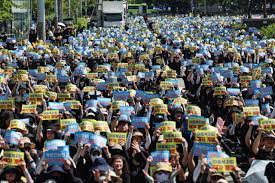On Monday, approximately 50,000 South Korean teachers demonstrated in Seoul to demand better protection of their rights and to draw attention to what they described as pervasive harassment by overbearing parents that has prompted some colleagues to commit suicide.
After a young teacher was discovered dead in July in what appeared to be a suicide, complaints by public school teachers about mistreatment by parents and students, such as accusations of child abuse for disciplining students, have increased dramatically.
“To inquire is to mourn,” read some of the banners at the peaceful demonstration.
One teacher who participated in the rally, but gave only her surname, Lee, in order to maintain her anonymity, stated that legal protections for teachers had been inadequate and that government officials had been inactive in this regard.
“On top of classes, there have been unnecessarily heavy workloads and excessive complaints from students and parents,” she added. Throughout my fifteen years of teaching, they have been a comprehensive issue.
Approximately 100 South Korean public school instructors have committed suicide in the six years leading up to June. 57 taught in elementary institutions, according to government data.
His office stated that President Yoon Suk Yeol ordered officials to listen to teachers’ demands and work to defend their rights.
On Monday, a large number of teachers vowed to take a leave of absence in protest, while government and school board officials scrambled to prevent significant class disruptions and promised legal measures to enhance protection.
Organizers estimated that between 60,000 and 70,000 teachers held rallies outside of Seoul.
Authorities warned that collective teacher action to disrupt classes was unlawful and threatened disciplinary action.
According to the group heading the protests, Everyone Together As One, the South Korean teachers’ union was not involved in Monday’s demonstrations.
Protest organizers said in a statement, “We will protect them (the teachers) and make changes so that not one more teacher takes their own life.”
In July, an elementary school teacher was discovered deceased at school after expressing anxiety over a parent’s complaints about a dispute between students.
67-year-old Jung Chai-jin was among the visitors to the memorial for the teacher set up at an elementary school in Seoul.
“Because they loved children, they worked hard to get into education schools and became teachers,” she said. “And they must perish in this manner in the classroom?”
Ku Bo-na, a fifth-grader from another school who also visited the memorial, said, “Teachers are those who make me grow, so it will be sad if my teacher passes away.”
Since the death, teachers have held nationwide vigils and demonstrations each weekend, culminating in a rally attended by as many as 200,000 teachers near the National Assembly in Seoul on Saturday.
ALSO READ : On Delhi visit, Joe Biden thanked PM Modi for G20 leadership.
According to data from the World Health Organization and OECD, South Korea has the highest suicide rate among developed nations, with more than 20 people per 100,000 of its population ending their own lives.
The ministry of education has pledged to prevent teachers from being disciplined for legitimate educational activity and to improve communication between teachers and parents.
“The number of reports of indiscriminate child abuse has increased as the rights of students have been overemphasized while those of teachers have not been respected,” it said in a statement.
“We will support educators so they can focus on education without worrying about receiving indiscriminate reports of child abuse.”
The ministry established a task force on Saturday to strengthen legal measures and assure teachers’ rights, such as not accepting calls from parents on their personal phones, but did not specify a timeframe.





